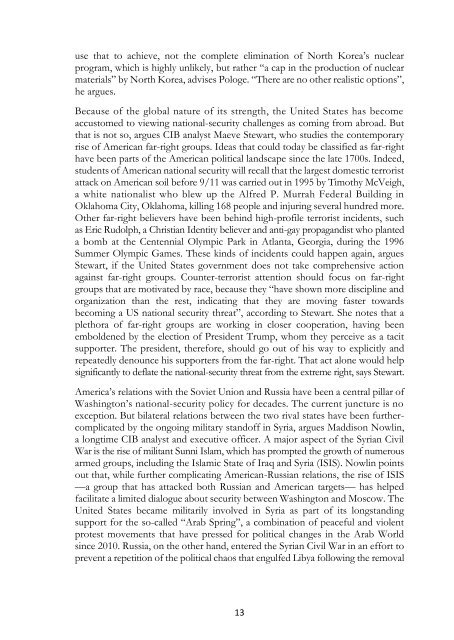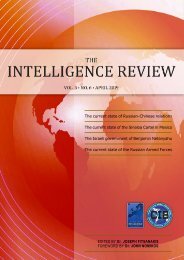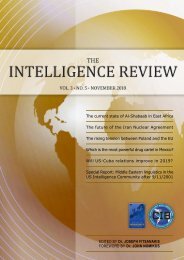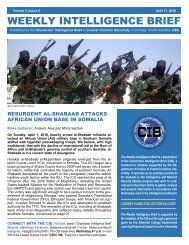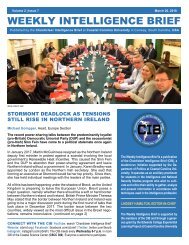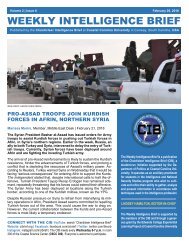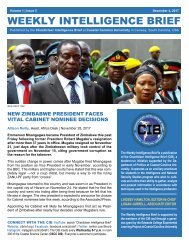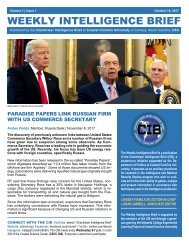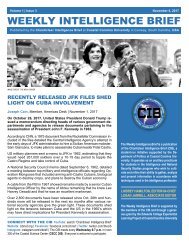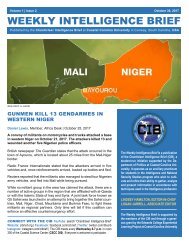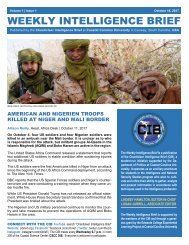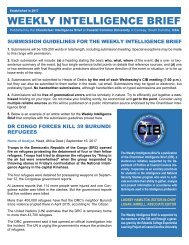The Intelligence Review | volume 2 | issue 4 |
This volume is the product of a collaboration between the European Intelligence Academy (EIA) and the Chanticleer Intelligence Brief (CIB), a student-run initiative supported by the Department of Politics at Coastal Carolina University in Conway, South Carolina, United States. Four CIB analysts tackle some of the most pressing and timely questions confronting intelligence observers today. Topics in this volume include the possibility of a war with North Korea, and the rise of far-right militancy in the United States. The volume also includes an assessment of the impact of the Islamic State in the relations between Russia and the United States, and a discussion of Turkish politics and its effect on NATO's cohesion.
This volume is the product of a collaboration between the European Intelligence Academy (EIA) and the Chanticleer Intelligence Brief (CIB), a student-run initiative supported by the Department of Politics at Coastal Carolina University in Conway, South Carolina, United States. Four CIB analysts tackle some of the most pressing and timely questions confronting intelligence observers today. Topics in this volume include the possibility of a war with North Korea, and the rise of far-right militancy in the United States. The volume also includes an assessment of the impact of the Islamic State in the relations between Russia and the United States, and a discussion of Turkish politics and its effect on NATO's cohesion.
Create successful ePaper yourself
Turn your PDF publications into a flip-book with our unique Google optimized e-Paper software.
use that to achieve, not the complete elimination of North Korea’s nuclear<br />
program, which is highly unlikely, but rather “a cap in the production of nuclear<br />
materials” by North Korea, advises Pologe. “<strong>The</strong>re are no other realistic options”,<br />
he argues.<br />
Because of the global nature of its strength, the United States has become<br />
accustomed to viewing national-security challenges as coming from abroad. But<br />
that is not so, argues CIB analyst Maeve Stewart, who studies the contemporary<br />
rise of American far-right groups. Ideas that could today be classified as far-right<br />
have been parts of the American political landscape since the late 1700s. Indeed,<br />
students of American national security will recall that the largest domestic terrorist<br />
attack on American soil before 9/11 was carried out in 1995 by Timothy McVeigh,<br />
a white nationalist who blew up the Alfred P. Murrah Federal Building in<br />
Oklahoma City, Oklahoma, killing 168 people and injuring several hundred more.<br />
Other far-right believers have been behind high-profile terrorist incidents, such<br />
as Eric Rudolph, a Christian Identity believer and anti-gay propagandist who planted<br />
a bomb at the Centennial Olympic Park in Atlanta, Georgia, during the 1996<br />
Summer Olympic Games. <strong>The</strong>se kinds of incidents could happen again, argues<br />
Stewart, if the United States government does not take comprehensive action<br />
against far-right groups. Counter-terrorist attention should focus on far-right<br />
groups that are motivated by race, because they “have shown more discipline and<br />
organization than the rest, indicating that they are moving faster towards<br />
becoming a US national security threat”, according to Stewart. She notes that a<br />
plethora of far-right groups are working in closer cooperation, having been<br />
emboldened by the election of President Trump, whom they perceive as a tacit<br />
supporter. <strong>The</strong> president, therefore, should go out of his way to explicitly and<br />
repeatedly denounce his supporters from the far-right. That act alone would help<br />
significantly to deflate the national-security threat from the extreme right, says Stewart.<br />
America’s relations with the Soviet Union and Russia have been a central pillar of<br />
Washington’s national-security policy for decades. <strong>The</strong> current juncture is no<br />
exception. But bilateral relations between the two rival states have been furthercomplicated<br />
by the ongoing military standoff in Syria, argues Maddison Nowlin,<br />
a longtime CIB analyst and executive officer. A major aspect of the Syrian Civil<br />
War is the rise of militant Sunni Islam, which has prompted the growth of numerous<br />
armed groups, including the Islamic State of Iraq and Syria (ISIS). Nowlin points<br />
out that, while further complicating American-Russian relations, the rise of ISIS<br />
—a group that has attacked both Russian and American targets— has helped<br />
facilitate a limited dialogue about security between Washington and Moscow. <strong>The</strong><br />
United States became militarily involved in Syria as part of its longstanding<br />
support for the so-called “Arab Spring”, a combination of peaceful and violent<br />
protest movements that have pressed for political changes in the Arab World<br />
since 2010. Russia, on the other hand, entered the Syrian Civil War in an effort to<br />
prevent a repetition of the political chaos that engulfed Libya following the removal<br />
13


